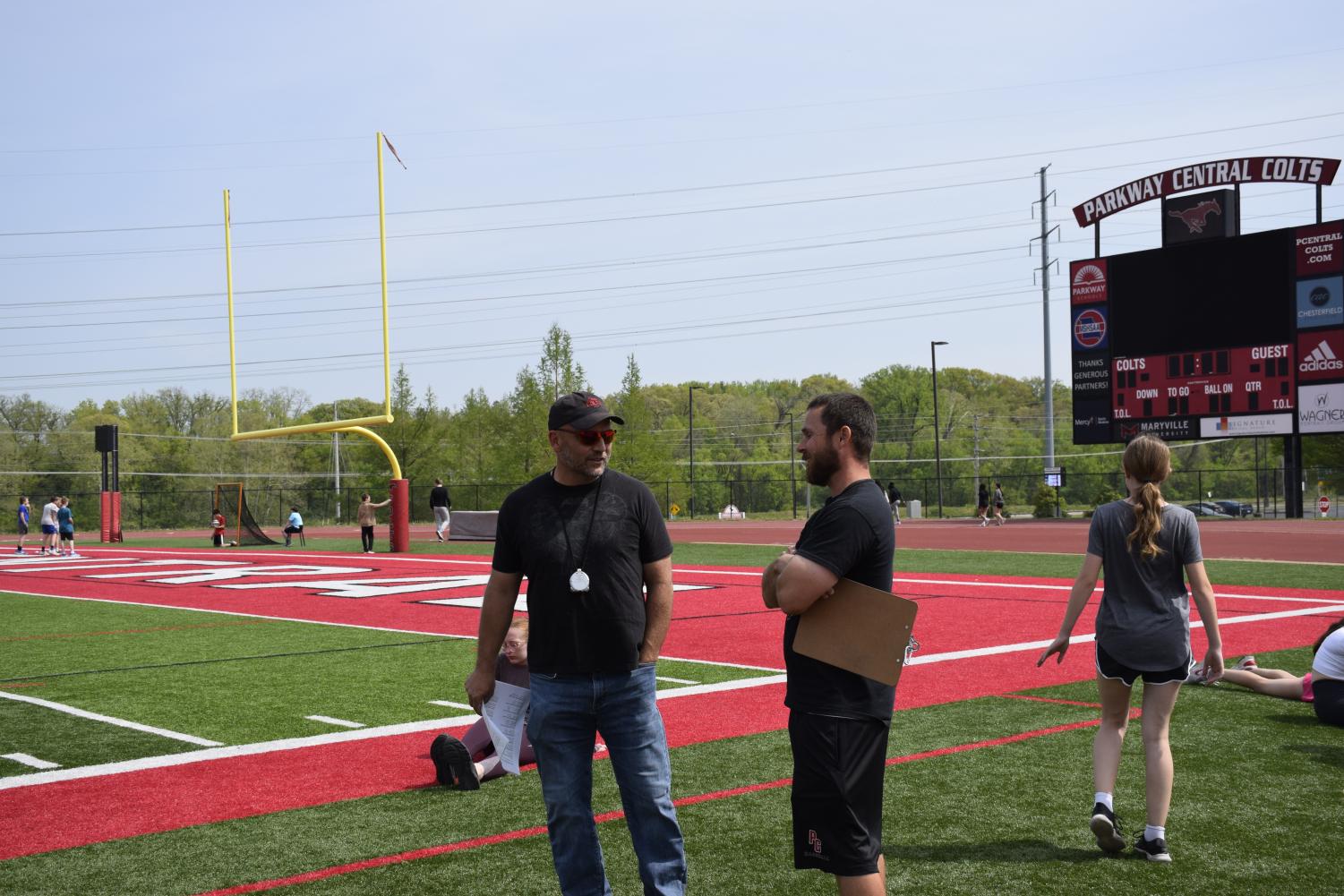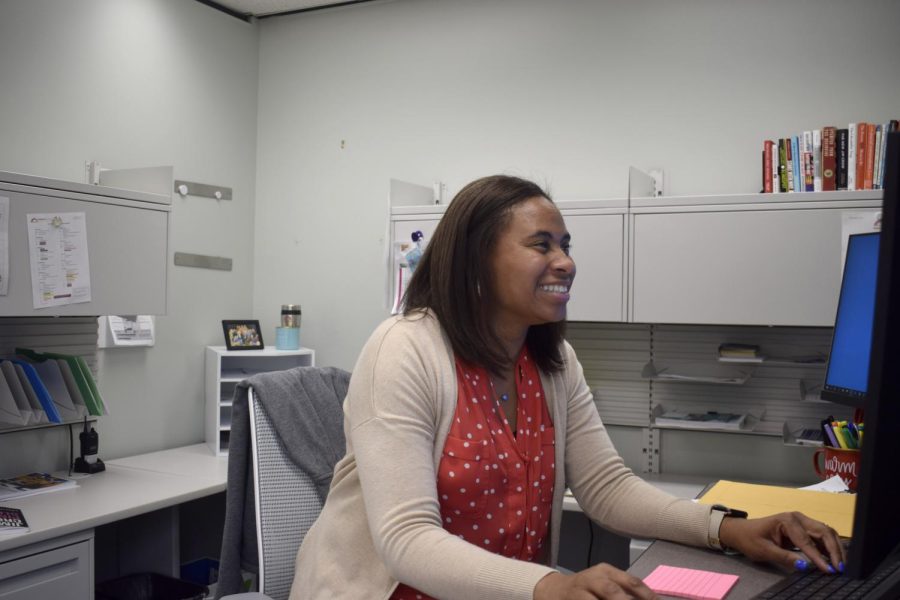District Cuts Teacher’s Plan Time
New contract cuts high school teacher’s plan time next school year
Parkway Deputy Superintendent Tiffany Holman-Besse works in her office in Parkway Administrative Center. Photo by Esther Wang.
May 12, 2023
On April 18, the building principals of all four high schools met with their staff members to confirm that teachers’ plan time will be cut short next school year. The policy could change Parkway high schools in many different ways.
Basic Policy
High school teachers currently have 450 minutes of plan time per week, which exceeded the 250 minutes promised in their contract. Jeff Rogers, as an English teacher and a member of the Building Responsibility Task Force, met with teachers from four Parkway high schools on April 10 to discuss what this new policy will look like.
“Teachers have 90 minutes of planning time in a block day, two 45 minutes on all days,” Rogers said. “So the district decided to take 135 minutes away from that plan. It’s basically up to the discretion of the building principal.”
The policy was brought to the table during Parkway National Education Association (PNEA), Parkway’s teacher union, and Parkway superintendents’ contract negotiations on November 30th last year. The negotiation about teachers’ contracts happens once every three years.
In late February, PNEA members, all Parkway educators, voted on the new contract that includes plan time cut. After it passed with PNEA majority vote, the new contract was ratified by the school board before spring break.
“If you’re a member of the PNEA, you voted on whether you wanted to ratify the new contract or not,” Rogers said. “So people had an idea that was happening but we didn’t know exactly what that was going to look like.”
Parkway Central High School’s principal, Dr. Tim McCarthy, said high schools will assign teachers new tasks based on students’ needs, but they’re still being decided by the Building Responsibility Task Force. Some of the potential tasks include hallway supervision and tutoring.
“Teachers in different buildings could have very different experiences and expectations,” McCarthy said. “We don’t want it to be so rigid that different groups of teachers don’t have flexibility to meet a need.”
Due to teachers’ concerns about not having enough time to grade and plan lessons, the plan time cut policy has been changed from immediately taking away 135 minutes of plan time in August to a three-phase plan.
According to an email that Dr. Keith Marty sent on behalf of the Superintendent Action Team, the first phase will take place next semester. 90 minutes of teachers’ weekly plan time will be taken out, and teachers will be assigned supervision tasks. The second phase will be in the second semester of next school year, and teachers may have the option to spend 90 minutes assisting students. During the 24-25 school year, teachers will adjust and spend 135 minutes per week doing a combination of tasks that best benefit students.
“In order to meet the ultimate goal of providing a high-quality learning experience for all students, we have work to do beginning this fall,” Marty wrote. “We absolutely need high school teachers’ input and problem-solving as we evaluate how to best support our students and ensure their success.”
There are many reasons for the district to implement this new policy. Tiffany Holman-Besse, the deputy superintendent of Parkway School district, said Parkway superintendents proposed this policy because data shows students don’t have their needs met.
“I think the data [superintendents are looking at] feels like it’s nebulous: it’s not,” Holman-Besse said. “We were looking at student achievement data opportunities, as well as looking at our social-emotional well-being, and belonging data.”
Parkway superintendents believe that plan time cuts will result in more teacher support, provide students with a sense of belonging, and help them better integrate into high school life.
“When you think about relationship building and the interaction with adults, specifically during unstructured times such as between classes, lunch supervision or through more direct student supports like a writing lab, simply building those relationships ,and causing students to feel a stronger sense of belonging or even develop a sense of belonging,” Holman-Besse said. “It does feed their social [health], emotional health and well-being.”
Multiple teachers reported elementary and middle school teachers have taken on more building responsibilities in the past few years. Many teachers, including English teacher and speech and debate coach Mattie Rudolph, believe that equalizing responsibilities for all teachers in the district was what motivated superintendents to make this decision.
“What the district did to us is what they did to them [elementary school and middle school teachers],” Rudolph said. “I know that they help with bus duty, lunch, supervision, etc.”
School Curriculum
There is a possibility that students will receive an altered curriculum next year because teachers have to work differently to cope with the new change. The classes that need specific setup for projects might be affected the most, such as in Brandon Franck’s engineering classes.
“For design tech, we’re starting to put in more hands-on projects this semester. That’s harder to develop. You can’t do that in the hallway,” Franck said. “It’s more so for science because you have to set up different labs, and I’m in the same boat as that.”
For classes with more grading, such as English, teachers may be returning assignments later since they don’t have sufficient time to grade at school. English teachers also predict students will receive less feedback.
“It’s not even just the quantity of feedback but it’s the speed with which you can get that feedback,” Rogers said. “If it takes now four or five weeks to grade a batch of 65 essays or 75 essays, well, that feedback is a lot less meaningful because the student wrote it a month ago and they don’t remember.”
Teachers will have less time to plan for lessons, which will impact the quality of teaching.
“Teachers have shared how we already do not have sufficient time during our planned periods to plan these really engaging lessons, especially with our new curriculum rollout for English next year,” Rudolph said.
The science department also decided to halt test corrections because teachers don’t have enough time to support students in school.
Extracurricular activities
Parkway high schools’ extracurricular activities are sponsored by high school teachers, and they take teachers extra time to plan.
“My school’s Mu Alpha Theta chapter will not exist next year. I would also be very surprised to see our e-sports sponsor continue to sponsor the club next year,” Aman Pai, a senior at Parkway North, said. “It really feels like a lot of extracurricular spirit will be lost next school year.”
For Parkway Central, many of the teachers feel stressed to continue sponsoring clubs. Rudolph has decided to continue sponsoring the school’s Speech and Debate team.
“I’ve decided ultimately, I made an emotional decision to do it,” Rudolph said. “Do I think I’m going to survive next year? I am very concerned about my own mental health.”
For an activity like Speech and Debate, a lot of behind-the-scenes work falls on the shoulders of sponsors. Teachers will now have less time to manage extracurricular activities after plan time cuts.
“There’s a lot of paperwork, a lot of filing… making sure that we get the resources that our team needs,” Rudolph said. “That basically is to help the team run and become eligible for competition.”
Next school year, the speech and debate team will have to attend fewer tournaments and have fewer practices. Rudolph also requires more outside help, whether that’s other adults or students on the team, to keep the team together.
“Having an assistant coach would be wonderful,” Rudolph said. “But even then, that coach will most likely be a teacher here whose plan time is also taken away.”
In athletics, teachers are paid extra to coach a sport. But according to Banta, who has been coaching for over 20 years, the pay isn’t the reason why teachers step in to coach.
“I am definitely paid to coach both of the seasons. However, if you break it down, it is well below minimum wage,” Banta said. “Pay is often the excuse for our partners to accept the fact that we’re spending so much time away from our family.”

Banta is the head coach for girls’ cross country and girls’ track and field. Both sports have a very successful history at Parkway Central, and they require much commitment from coaches.
“We ask a lot of our coaches to educate themselves with some online coursework,” Banta said. “That takes a lot of extra time outside of practice [and the] classroom”
Summer and winter conditioning for athletes might be affected as well. Coaches are not paid to do the conditioning, however, it’s impossible to have a successful season without them.
“An off-season… not only to make sure that they’re [the athletes are] competitive, but also to make sure that they don’t get hurt,” Banta said. “And so one of the reasons why we’ve been so good for so long is we have this very robust offseason program, that’s not mandatory. But a lot of kids know that they get better if they do it.”
Overall, taking plan time away allows coaches less time to prepare for their training and connect with athletes in the program.
“I have met many young men and women who I now consider family because of those bonds that we’ve built through those relationships,” Banta said. “Through the years, the blood, sweat and tears and sacrifices that they’ve made through my sports programs, I would be unable to build that same level of a relationship with the same number of kids without that.”
Teacher Reaction
The teachers here generally expressed confusion and frustration over the new policy. They don’t understand what the district is trying to achieve with this policy.
“[The superintendents] not being honest about why the time is being cut is really hurtful and frustrating,” Rudolph said. “As teachers, as educators, you know that every decision you make should be researched [and] data-based, and they’re not doing that.”
Because of the vague explanation from the upper level, teachers are not sure how they should brainstorm new tasks to do since they don’t know what problems the district is trying to solve.
“There’s no one who doesn’t want to solve this problem, but we don’t know what the problem is because we have not been shown the information, and I think that is very frustrating,” Rogers said.
They also believe it would require them to work even more hours outside of school, which they aren’t willing to do because it means being away from their family.
“I have to spend time with my family, especially right now when [my kids] are so young,” Franck said. “[Spending time with my kids] is my priority.”
Aside from their family, teachers worry about their own mental health. Especially right after COVID, this is another huge change in their work life. Many feel that this decision means that the higher-level administration doesn’t care about teachers.
“It makes us feel like our mental health doesn’t matter,” Rogers said. “We have to spend more time outside of school, which means we’re working for free. It just feels like the district is assuming that we’re going to do that… I think [it] just really demoralizes the staff.”
Even though the new plan time suggests students will have more time with teachers, many teachers aren’t sure the new policy will help the students.
“Personally, I would happily give up some of my plan time if it was meaningful and we were able to actually help kids,” Rogers said. “I do not think in any way that sitting in the hallway is going to help a kid.”
Teachers also questioned the decision-making process of the policy. According to Rudolph, who has been working at Parkway for eight years, teachers used to make most decisions about schedules.
“[When] COVID hit, the district, rightfully so at the time, went across the board to try and make sure that all high schools were providing the same opportunities for student learning when it went to virtual learning,” Rudolph said. “But they have since not given back the autonomy that the high school buildings had.”
Furthermore, the plan time cut policy in the new contract applies only to high school teachers, but all teachers in the district voted on the contract. Many high school teachers feel they’re not fully represented.
“In terms of negotiations, that’s not agile enough to really focus on the differences between an elementary school teacher, a middle school teacher and a high school teacher,” Banta said. “[For] an elementary school teacher, there’s not going to be as many additional things that are going to be provided for after school.”
In response to the feedback from teachers, Holman-Besse said the superintendents are working together with the teachers to implement the policy.
“I understand that teachers have a concern of workload. I do believe that teachers are working as efficiently as they possibly can,” Holman-Besse said. “We do not want them to take shortcuts from the curriculum, but we also don’t want to overwork [them].”
Student Reaction
Students are concerned about extracurricular activities at school. Sophomore Aaron Loudenback is involved in the robotics club and is a member of both the track and field and cross country teams at Parkway Central, and he thought the plan time cut will impact his activities.
“Personally, I feel that could possibly affect the course of how our practices go,” Loudenback said. “Maybe the time that they [the coaches] put in, like attending to helping us with the practices, they now have to go back and grade stuff.”
Besides the extracurriculars at school, students are resentful of core education as well. Many students have heard about teachers cutting curriculum, and that will impact their learning experience.
“Teachers will not be able to give personalized feedback on assignments, leading to stunted student growth. I already know for a fact that science teachers will be cutting labs next year,” Pai said. “For AP classes, it’s scary since these classes have a set lab requirement to receive college credit for the course.”
Considering all factors in their lives, most interviewed students held a negative attitude toward the new plan time cut.
“The new policy is cutting down on plan time by almost half,” sophomore Andrew Rubin said. “[This] will be very influential, and I’d say outrageous because for teachers and students, their lives will be affected by it.”
Students also sympathize with the teachers. Sophomore Camden Lovera, whose parent is a teacher here, believes it’s an arbitrary decision made by the district which demands teachers work more hours outside of school.
“I talked with a teacher recently about how their kids are growing up, and they’re needing more and more attention. Cutting plan time is making them work more outside of contract hours,” Lovera said. “It just takes more and more time away from their family. And I think that’s completely unfair of them to do.”
Overall, it confuses students about what message the district is trying to send to high school students.
“I think it’s a massive step backward for the district. My four years at Parkway were built upon staying after school to tutor, get tutoring, and participate in a wide variety of clubs that I am passionate about,” Pai said. “The underclassmen won’t be able to have the same, or even better experience than I did, and that sincerely upsets me.”
Potential Changes
Student pushback has been obvious over the week of April 17. There was a petition going around Parkway Central released on April 18, and an email storm targeted at superintendents on April 21. Many staff members support the student demonstration.
The first pushback was on April 11, when Lovera founded the organization Students Against Parkway’s Choices (SAPC). They don’t wish to involve any teacher in the group. Loudenback was made an admin for his contribution.
“Our end goal is to get all the students at Parkway. But right now it’s severely limited to just Central and within that, even just a sophomore class,” Loudenback said. “We need to find a way for us to comfortably get the word out to other grade levels and other schools.”
Four SAPC members, along with other students and teachers from Central and North all spoke at the board meeting on April 17. They expressed their frustrations about the new policy and demanded an official response.
“I thought our students represented themselves incredibly well and I was so proud of them,” Rogers said. “I’m hopeful that they will [influence the policy].”
The group is confident they’ll have some influence over the plan time decision, but at the superintendent level, no changes are being made in response to student actions.
“A reversal of that decision would still come through a collaborative process,” Holman-Besse said. “And at this time there was no discussion about a reversal of the decision.”


